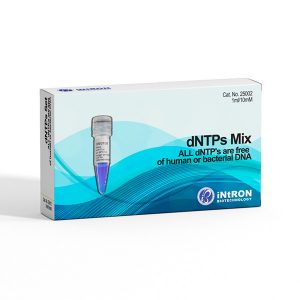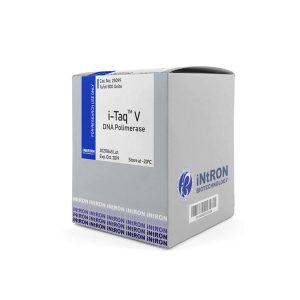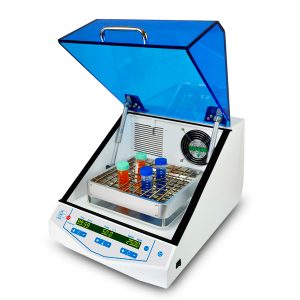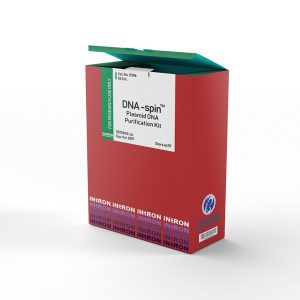Taq Polimerasa c/dNTP´s
High-purity i-Taq™ PCR core kit that displays stable and efficient DNA amplification regardless of template type and reaction conditions 94 KDa thermostable DNA polymerase
- High purity Taq DNA Polymerase
– Removal of E. coli -derived proteins and DNA that may act as PCR sources - Applicable to DNA from cloned DNA to human genomic DNA
- Buffer optimization to show the best polymerase activity regardless of template type or reaction conditions
- Pack Promo 5×500 units.Código: 25022-5
299,00€
Taq DNA Polimerasa i-Taq
High-purity i-Taq™ PCR core kit that displays stable and efficient DNA amplification regardless of template type and reaction conditions
• 94 KDa thermostable DNA polymerase
• High purity Taq DNA Polymerase
– Removal of E. coli -derived proteins and DNA that may act as PCR sources
• Applicable to DNA from cloned DNA to human genomic DNA
• Buffer optimization to show the best polymerase activity regardless of template type or reaction conditions
Taq Polimerasa i-Taq ™ DNA Polymerase is a thermostable DNA polymerase of 94 kDa, which is expressed in E. coli by cloning the polymerase gene of Thermus aquaticus (strain YT1). It removes the E. coli-derived protein and DNA which can act as a contaminant in PCR, It is stable and efficient DNA amplification product. Genomic DNA, cDNA, etc. can be amplified up to 5 Kb. PCR (Polymerase Chain Reaction) is a method of amplifying a desired DNA molecule in a test tube by specifically repeating synthesis of a specific DNA site. As a result, it is possible to synthesize a large amount of DNA using a very small amount of DNA, Of course, it is widely used in the fields of basic biology, medicine, and biology. We are now expanding the scope of its use in the fields of forensic medicine, food, environmental hygiene, and animal and plant inspection in a simple and quick way. DNA polymerase chain reaction can amplify DNA of specific site in a few hours up to 105-108 times in vitro. The amplified DNA can be used for various experiments as follows. Based on the experimental results, various medical researches Can be applied to. In the early days when this method was developed, PCR was performed using Escherichia coli DNA Polymers, so it was necessary to supplement DNA polymerase of denatured Escherichia coli at every denaturation. However, by using the thermostable DNA Polymerase isolated from Thermus aquaticus in PCR, we did not have to do the troublesome task of supplementing the enzyme every step. As a result, PCR became an indispensable method for molecular biology. PCR has a series of three steps and repeats 30 to 40 times.
The first step in the PCR is denaturation of the DNA, separating the two strands of DNA by heating. Each separated DNA serves as a template and the denaturation temperature depends on the amount and length of G + C in the DNA. The second step in PCR is annealing. At this stage, the primers bind to the template DNA and the annealing temperature is an important factor in determining the accuracy of the reaction. If the temperature is too high, the primers will bind too weakly to the template DNA, If the temperature is too low, undesirable DNA can be amplified because the primers bind nonspecifically. The third step in PCR is the elongation step. At this stage, heat-resistant DNA polymerase will make new DNA from the template DNA. Taq Polimerasa i-Taq ™ DNA Polymerase In addition to high purity enzymes, it is possible to obtain highly reproducible results by optimizing the buffer composition to exhibit the best polymerase activity irrespective of the type of template or half of the template. Since most of the products amplified with this enzyme have a base A at the 3-terminus, the PCR product can be cloned into a T-vector as it is. It can also be cloned into a blunt-end vector by phosphorylating it into a blunt end by filling it with a DNA polymerase such as Klenow DNA Polymerase or T4 DNA Polymerase.
![]() Applications
Applications

![]() Kit Contents
Kit Contents

![]() Technical Data
Technical Data
Sensitivity comparison data (comparison with other companies)

Sensitivity comparison of i-Taq™ DNA Polymerase with DNA polymerase of the same function of Company A, B. In this experiment, Bovine gDNA was diluted by concentration and amplified with CSF primer.
Lane M, 100 bp DNA Marker; lane 1, 1 ng gDNA; lane 2, 100 pg gDNA; lane 3, 10 pg gDNA; lane 4, 1 pg gDNA; lane 5, 100 fg gDNA; lane N, Negative control
Batch stability Data

The sensitivity activity of each batch of i-Taq™ DNA Polymerase was confirmed. GAPDH (575 bp) and 1 Kb fragment were amplified from serially diluted SNU-1 cDNA and Lambda DNA to confirm the sensitivity. Total 20 ml reaction mixture was amplified using 1 unit of i-Taq™ DNA Polymerase and 5 ml was electrophoretically analyzed by agarose gel.
Lane M, 100 bp DNA Marker; 1 Kb DNA Marker; lane N, Negative control




















